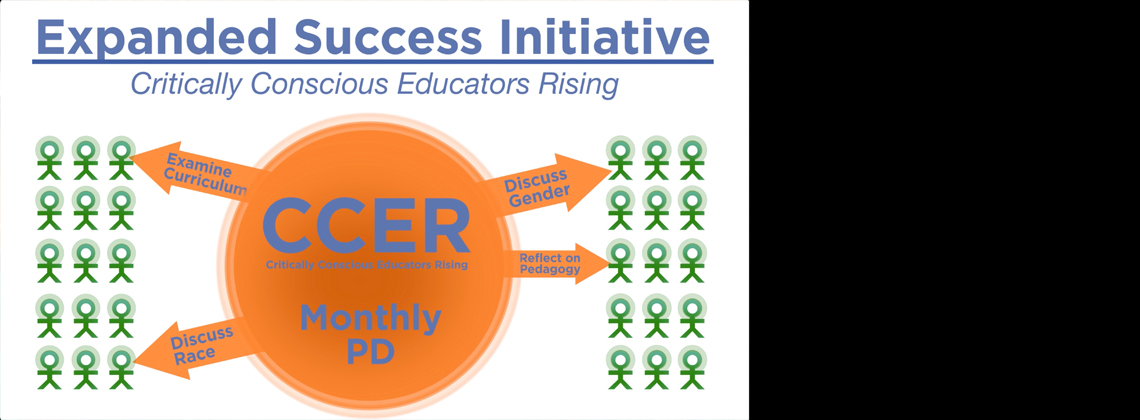Video Summary:
Classroom teachers meet to examine their beliefs and practices in serving students, especially young men of color.
The Critically Conscious Educators Rising series, is a cohort of classroom teachers that meets monthly to examine their beliefs and practices in serving students, especially young men of color. Culminating in a teacher led conference, these participants will not only examine their own beliefs and pedagogy but they will encourage their peers to do the same. The goal of the series is to have teachers walk away from each session asking themselves, “How does this new understanding, peeling back a layer, affect how I interact with students and colleagues?” The hope is that they will move beyond theory into an elevated understanding, then action and practice.
Critically Conscious Educators Rising Series (CCER)
In partnership with the Center for Strategic Solutions, the CCER series convenes a group of like-minded educators monthly to focus on tying theory to practice in the pursuit of equity and racial justice in their classrooms and beyond. The group grows into a community of critically conscious educators who not only build their own knowledge and skill-sets, but work within their individual spheres of influence to encourage and push their peers to do the same to ultimately alter the classroom experience in a positive way.
Throughout the course of the school year, the group unpacks and examines internal belief systems and biases and they deeply analyze equity research to develop culturally responsive lessons and units that will be shared in the culminating Decolonizing Education Conference which is a conference for educators and by educators. The conference is co-sponsored by ESI and New York University’s Metropolitan Center for Research on Equity and the Transformation.
Over seven sessions, the CCER cohort deeply examines the following questions and topics:
What does the current national, state, and local data suggest about our beliefs, policies, and practices?
Participants discuss ways teachers can move past the discomfort of talking about race to ensure that Culturally and Linguistically Diverse (CLD) students have equitable outcomes and access to the high-quality education to which they are entitled.
To whose culture are we most responsive in school?
The cohort analyzes the definitions, differences between individual and societal, and impacts on teaching and learning of culture. They apply this analysis to transformation of the education system by implementing more culturally responsive strategies and techniques in schools.
What do we mean by power and privilege and how do they perpetuate a harmful impact on CLD groups?
Participants unpack the meanings, uses of, and impacts on society of the terms White supremacy, White privilege, and White fragility. Discussion of White people’s resistance to talking about race, power, and privilege as well as how White supremacy and White privilege promote the idea of Black inferiority will lead to the core questions of this session: who holds the social and cultural capital in any given situation, and how can social environmental cues impact this capital?
Revolutionizing How We Think About Educating CLD Students: Defining Critical Pedagogy
Participants hold a mirror to the ways current reforms have fallen short in transforming education for CLD students as well as challenge themselves to think about specific steps Urban Education reform movements must take to be effective. The group explores how Critical Pedagogy (CP) and “revolutionary love” can improve educational outcomes for CLD students.
Racial Trauma in America
Participants examine the ways Black and Brown and White Americans have suffered and continue to suffer from post-traumatic slave syndrome (PTSS) and design ways to begin the pathway to healing from PTSS. Click here to view the PowerPoint presentation for this session.
Factors That Impede Student Identity Development
The community scrutinizes how society, politics, and poverty intersect and impact and oppress the experiences and identities of student members of marginalized groups.
Identity Development: How Race Shapes and Informs Culture
In this culminating session, participants reflect on their own roles in perpetuating racist ideologies as well as ways to move forward to help create experiences based in positive racial and intellectual identity development for marginalized students.
Lesson Plans
As part of the CCER program, teachers design lessons based on the workshop learning experiences, put them to practice in their own classrooms, and share with the cohort and their school community. Click on the links for lesson plans and support materials.
Cassandra Baptiste
Middle SchoolRocks and Standing Rock
Cells-Build-A-Lot Lesson
Cells-Build-A-Lot Learning Plan
Steven Bufford
High School
Pierrette Celestin
High School
Ingrid Chung
High School
Edwin Done
Grade 7, 8
Jackie Jackson
High SchoolBlack History Month Awareness Project
Bad and Boujee Lesson
Bad and Boujee Learning Plan
Marlie Leopold
Elementary School
Charles Maciejewski
High School
Tom McConkey
Grade 12Paying the Cost for Being the Boss Lesson
Paying the Cost for Being the Boss Learning Plan
Heather Nordstrom
High SchoolThe World State and The Savage Reservation: A Postcolonial View
Joan Rowe
Grade 12
Antoinette Thorne
High SchoolBlack History: At What Cost?
I Have A Dream
Struggle for Freedom Lesson







